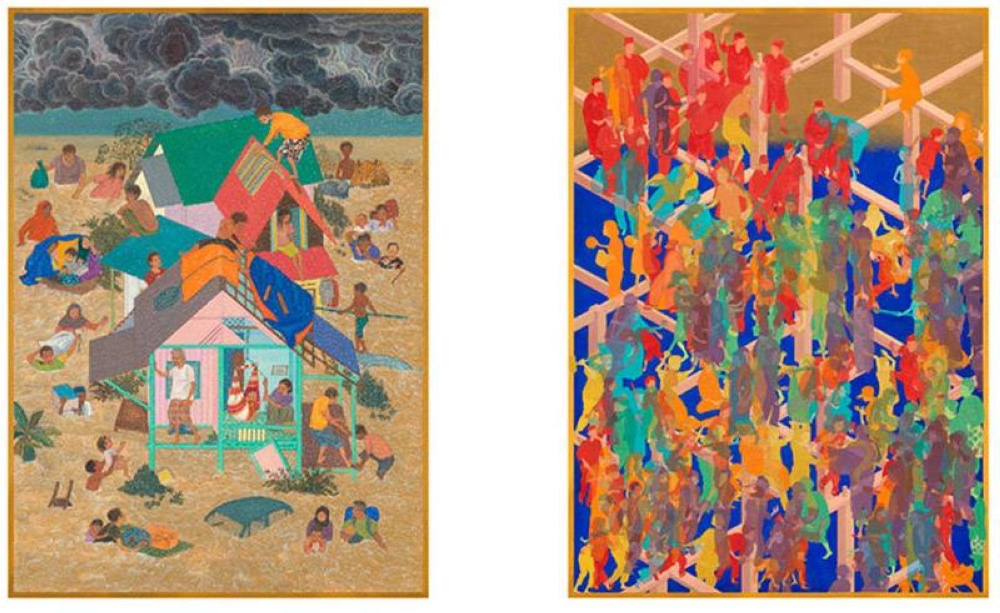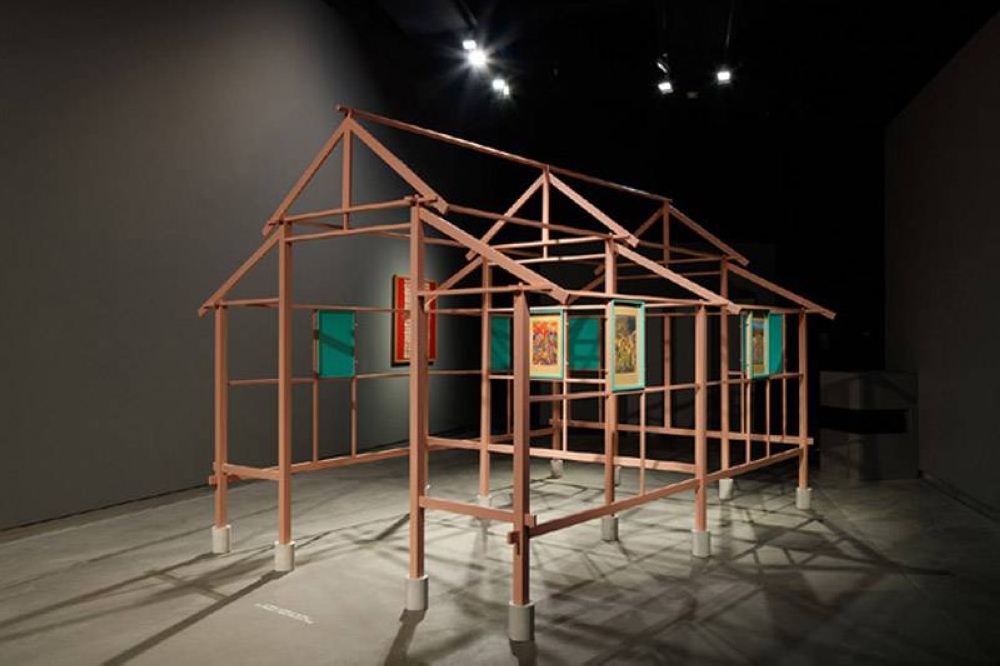KUALA LUMPUR, June 11 — In Nobel Prize-winning author Kazuo Ishiguro’s 1986 novel, An Artist of the Floating World, post-World War II Japan is depicted as a period of massive turmoil, particularly the changing values between older and younger generations.
In the miniature painting Floating World (2022, gouache on paper) by Malaysian artist Leon Leong, the same uneasy sense of upheaval is present.
Villagers are beset by a flood, with the traditional kampung house on stilts the only form of refuge. The lucky ones are atop the house, some as far up as the roof itself; the rest are left carrying their worldly belongings as they wade waist-deep in the murky waters.
Change is the only constant, yet isn’t it strange how we never seem prepared for it?
Leong’s Floating World is but one of seven miniature paintings that form his new installation titled "Stilt House No. 1”. (The other six paintings are titled Origin of Place, To Build a Village, Progress of Love, Being and Becoming, Theatre of History and Middle Way.)

The installation itself is a marvel — the structure reminds one of the skeleton of a kampung house. Look closely and you’d notice its clever wooden joinery. This, Leong notes, is a subtle, architecture-inspired homage to the gotong-royong spirit of the villagers.
This reverent nod to the generosity of kampung life isn’t by coincidence; the artist had spent the part of last year living in Kampung Baru, originally a Malay enclave in the heart of Kuala Lumpur.
Leong observes how his time as a temporary resident has informed his artwork: "Last December when I started painting Floating World, about the 1971 devastating flood that affected Kampung Baru badly, it was also when the December 2021 flood hit us.”
Founded in the city centre over a century ago, Kampung Baru makes for a stunning juxtaposition of the new and the nostalgic. On one hand, the neighbourhood sits on prime real estate. Yet it still feels rustic (though no one would confuse it for rural, given the preponderance of skyscrapers all around), with its traditional stilt houses.

It is this contrast that caught Leong’s attention. To him, Kampung Baru wasn’t a frozen photograph but a breathing, living space populated by all manner of distinctive experiences. As he puts it: "We are always living in an environment, it is the context for who we are.”
After living in Kampung Baru for a couple of months and familiarising himself with the lives and stories of the neighbourhood, Leong is now presenting his impressions as a new installation titled "Stilt Houses — The Floating World of Kampung Baru” at ILHAM Gallery, as part of the ILHAM Art Show 2022 (May 17 to October 23).
Ipoh-born Leong has had a storied career spanning literature, graphic design, interior design, education and, of course, fine art. Past works include "Cracks in the Wall” (2017-18), inspired by the Razak Mansion; the novel Beautiful Things (2006); and "Optimistic Melancholics” (2015), a solo exhibition inspired by a stint in Istanbul, Turkey.
"Stilt Houses — The Floating World of Kampung Baru” sees Leong turning to Indo-Persian miniatures to play with a variety of events and different themes on the same visual plane.

He explains, "I wanted to chronicle the rich and layered (hi)stories of Kampung Baru, to do that, I turned to the Indo-Persian miniature, a genre that once served as ‘history painting’ in parts of Asia, and a reference to the religio-cultural background of Kampung Baru’s early settlers.
"Miniature painting allows me to collapse time and space, bringing together multiple narratives within the same picture plane to narrate significant events that have shaped the enclave, including its present (in particular the mega redevelopment plans) at this critical juncture.”
In essence, we as viewers are witnessing the very history of Kampung Baru unfolding before us, from the past to perhaps the not-too-distant future as land redevelopment encroaches on a space with immense cultural heritage value.
Leong favours structured narratives: here, as with earlier works such as "Cracks in the Wall”, the multitude of lives and specific geographies in Kampung Baru are depicted as a cycle that works its way inexorably from the founding of the village down to its eventual fate.

We follow that journey, if only for a time.
One of Leong’s hopes is that those who view "Stilt Houses” will look more intently, and slowly. He shares, "Many people I talked to have visited Kampung Baru but beyond the few streets where the famous eateries are, hardly one can say he knows the place well. No one knows Kampung Baru is made up of seven distinct sub-villages.”
(As an aside, Leong has started an Instagram account called
@stilthouses that takes viewers on a slow journey of exploring and seeing Kampung Baru in a new light.)
The scale of the installation — house shaped structure and tiny, miniature paintings — indeed does compel the viewer to look closer and, hopefully, deeper. To engage more intimately with the issue rather than skim it in a passing manner like some tabloid headline. These are real lives, real people, and a precious, unique way of life.

Perhaps, then, it is inevitable that the installation is personal for Leong too, though he doesn’t go as far as confirming this. (One can only reside in a place for so much before one takes part in its rhythms and its fortunes though, no?)
Harking back to Ishiguro’s novel, An Artist of the Floating World, it is striking that the narrator is an ageing painter, who reflects on his life and his works, and wonders how the world sees his paintings differently now.
With his own Floating World, Leong might hope for the same, not for himself individually, but for the community he was blessed to be part of once, if only for a time.
The ILHAM Art Show will be held from May 17 to October 23, 2022 at:
ILHAM Gallery, Levels 3 & 5, Ilham Tower, No. 8, Jalan Binjai, KL
Open Tue-Sat 11am-7pm; Sun 11am-5pm; closed Mon and public holidays
For more information, visit:
https://www.instagram.com/leonleongwaipung






















